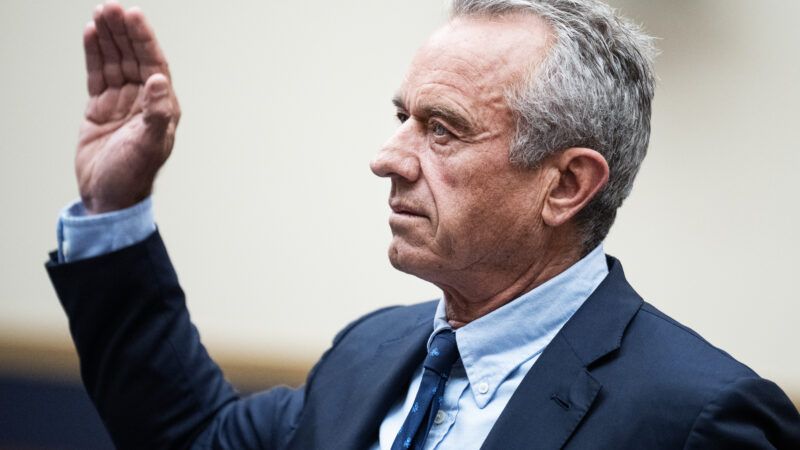Don't Censor RFK Jr.
After its spectacular screw-ups on COVID-19 "misinformation," the government shouldn't be so quick to squelch dissenting voices.

Democratic presidential candidate Robert F. Kennedy Jr. appeared last week before the House Select Subcommittee on the Weaponization of the Federal Government. The Republican majority invited Kennedy to testify about the government's campaign to suppress contrarian speech on COVID-19, vaccines, and the virus's origins; a tweet from RFK Jr. expressing doubts about vaccines had been among the first posts that the White House urged Twitter to restrict after President Joe Biden took office in January 2021.
Before Kennedy could even read his opening statement, Rep. Debbie Wasserman Schultz (D–Fla.) attempted to move the panel to executive session, which would have effectively blocked the public from hearing what the witnesses had to say. When Republicans called for a vote to table the motion, all the Democratic members of the subcommittee voted no.
In short: At a hearing intended to probe bureaucrats and politicians' well-documented efforts to crack down on disfavored speech, Democrats played exactly to type. Their first impulse was not merely to express disagreement with Kennedy's views, but to stop him from uttering them in public.
Their stated objection to Kennedy was a comment he had made claiming that COVID-19 may have been ethnically targeted, remarks widely seen as anti-Semitic. Del. Stacey Plaskett (D–Virgin Islands) said that by inviting RFK Jr. to testify, Republicans "intentionally chose to elevate this rhetoric to give these harmful dangerous views a platform in the halls of the United States Congress."
Plaskett did not merely criticize Kennedy's comments. She implied that they were not protected by the First Amendment. "Free speech is not an absolute," said Plaskett at the beginning of the hearing. "The Supreme Court has stated that."
The New York Times, in its recap of the hearing, echoed these concerns:
Despite the theater, the hearing raised thorny questions about free speech in a democratic society: Is misinformation protected by the First Amendment? When is it appropriate for the federal government to seek to tamp down the spread of falsehoods?
These are not, in fact, thorny questions. Of course misinformation is protected by the First Amendment—unless it veers into defamation or fraud, both narrowly defined legal categories. The modern Supreme Court has never validated the idea that speech expressing incorrect ideas is unprotected by the Constitution; if it had, the Times' own speech rights would be in jeopardy.
Indeed, Times' own story about Kennedy's controversial remarks itself contained misinformation. Its opening paragraph described the comments in question as "a conspiracy-filled rant by Robert F. Kennedy Jr. that the Covid-19 virus was engineered to spare Ashkenazi Jews and Chinese people."
The candidate did not, in fact, straightforwardly declare that COVID-19 was "engineered to spare Ashkenazi Jews and Chinese people." He said: "There is an argument that it is ethnically targeted. COVID-19 attacks certain races disproportionately." He also said: "COVID-19 is targeted to attack Caucasians and black people. The people who are most immune are Ashkenazi Jews and Chinese." And he said: "We don't know whether it was deliberately targeted or not but there are papers out there that show the racial or ethnic differential and impact." You can see why someone would raise an eyebrow at the suggestion that the virus even might have been "deliberately targeted," but a reporter should report what the candidate actually said.
Kennedy, for what it's worth, seems to have been referring to a study by the Cleveland Clinic that found some evidence the virus's genetic makeup could theoretically make certain populations—including the Amish and Ashkenazi Jews—less receptive to it. Some scientists have disagreed with the underlying findings of the Cleveland Clinic study; moreover, the disproportionate impacts of COVID-19 are likely best explained by certain populations' overall health, age, and access to medical resources.
Kennedy's larger point was that government funding of research that creates such viruses is dangerous. In an interview on Rising, the YouTube show I co-host for The Hill, the candidate claimed that "it never entered my mind that it was engineered directly to protect Jews and injure other people."
Unfortunately, the Democrats' behavior at the hearing is part of a pattern. Far too many political leaders have urged greater censorship of contrarian COVID-19 speech, especially online.
The vast federal bureaucracy—first under Donald Trump, and then in a greatly expanded fashion under Joe Biden—pushed private tech companies to censor speech that was critical of the government's approach to the pandemic. Both the Twitter Files and Reason's own Facebook Files show that the White House, the Centers for Disease Control and Prevention, the Department of Homeland Security, the FBI, and other arms of the government frequently contacted content moderators for the purpose of jawboning. These pushes for greater content moderation were not just philosophically wrong—that is, at odds with principles of free speech—but they were often wrong about the underlying facts as well.
One need not cosign everything RFK Jr. has ever said about the virus or vaccines to admit that the mainstream purveyors of pandemic-related information made grave errors of scientific judgment. For instance, The New York Times' lead coronavirus reporter, Apoorva Mandavilli, said the lab leak theory of COVID-19's origins was a "racist" falsehood, and she was in good company. The establishment media's persistent crusade to demonize lab-leak dissenters—other than a tiny number of cautiously dissenting voices—did not end until earlier this year, after multiple federal agencies finally concluded that a lab leak was more likely than natural spillover.
If leading Democratic politicians, government health experts, and mainstream media reporters engaged in some self-reflection about their own role in pandemic-era authoritarianism, they might better understand the appeal of a candidate who is running on an explicit platform of never repeating such mistakes.


Show Comments (85)